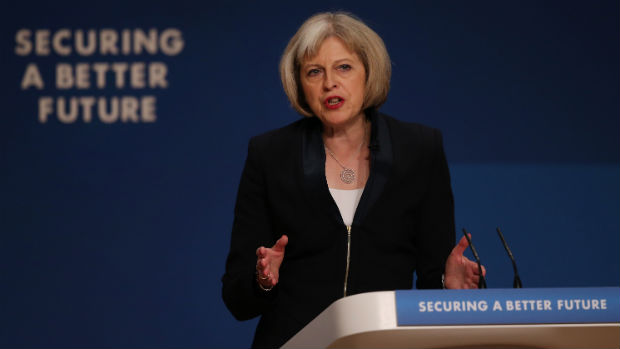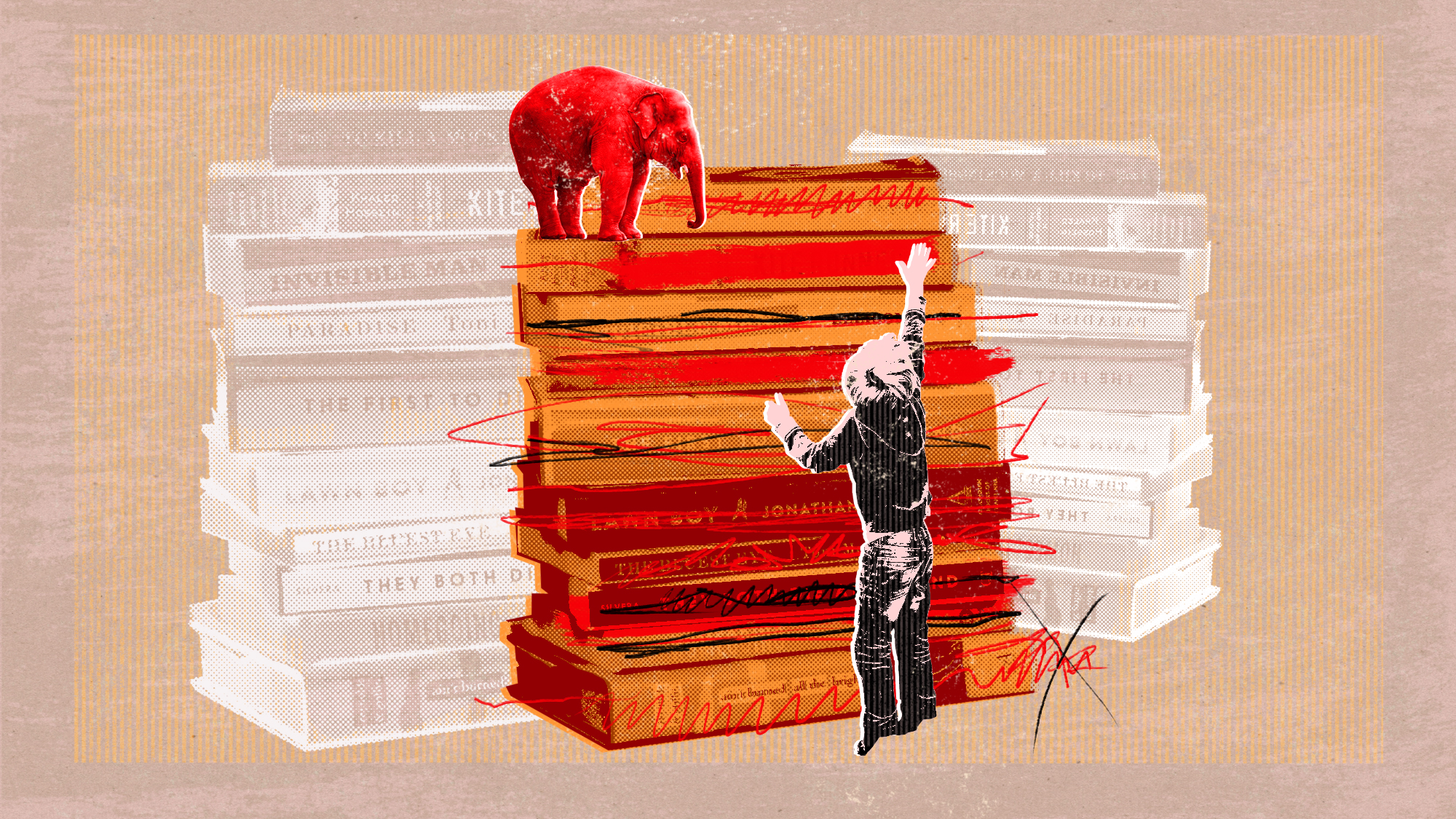Mondeo Man left out in the cold as Tories target core voters
Theresa May announces 'terrorist Asbos' as Labour and the Conservatives rally their partly loyalists

A free daily email with the biggest news stories of the day – and the best features from TheWeek.com
You are now subscribed
Your newsletter sign-up was successful
The Home Secretary has announced plans to introduce 'Extremist Disruption Orders' - already nicknamed 'Terrorist Asbos' - to silence the so-called hate preachers who seek to radicalise young British Muslims.
Despite warnings from senior Lib Dems that they will breach civil liberties, Theresa May told the Tory party conference today that the police and security services need new powers to silence hardline individuals and organisations whose activities, as The Independent puts it, "fall just short of breaking existing laws".
Earlier, David Cameron had defended the measures against criticism from his party's coalition partners.
The Week
Escape your echo chamber. Get the facts behind the news, plus analysis from multiple perspectives.

Sign up for The Week's Free Newsletters
From our morning news briefing to a weekly Good News Newsletter, get the best of The Week delivered directly to your inbox.
From our morning news briefing to a weekly Good News Newsletter, get the best of The Week delivered directly to your inbox.
"For too long, we have been tolerant of this behaviour," Cameron told Radio 4's Today programme. "We need to be a little bit more intolerant.
"We have to deal with the extremism in our midst, not just the violent extremists, but also those extremists who know how to navigate the line between what is currently legal and illegal but nevertheless poison young minds in online sermons and end up with people wanting to commit terrorist acts or to travel to Syria and take part in brutal activity."
The new powers would be far more sweeping than existing banning orders for extremist groups or individuals accused of “incitement to violence”. They would ban hate preachers from using Facebook, Twitter and online chatrooms to groom vulnerable teenagers.
The powers would also apply to ultra-right Neo-Nazi groups and see the reintroduction of broadcasting bans on extremists last used in the 1980s to keep Sinn Fein leaders Gerry Adams and Martin McGuinness off television.
A free daily email with the biggest news stories of the day – and the best features from TheWeek.com
Cameron told the Today programme: "My judgment is at the moment our ability to ban extremist organisations is limited by the fact that it has to be ones that especially espouse violence rather than that extremist narrative that the violence is based on."
Lord Carlile, a Lib Dem lawyer and former government advisor on terrorism legislation, warned the plans would breach civil liberties. "As a democratic society, we have to be prepared to accept opinions we do not like as long as they do not incite violence... These orders would apply to 'raising alarm or distress' – that seems to me to be a very low test."
The civil liberties industry and the courts will have a field day with the proposals if they are ever brought forward in legislation, which raises the question - why are such controversial measures being raised now, seven months before a general election?
Simple. The Tory high command believes the measures will be popular with voters appalled at the failure to stop the preachers of hate recruiting young Muslims to jihadism, and they will help draw a sharp dividing line between the policies proposed by Conservatives and those offered by Labour and the Lib Dems.
It is now clear that both the main parties, Tories and Labour, are preparing to fight the May 2015 general election on a core vote strategy rather than battling over the centre ground.
Labour is already being accused of following a cynical '35 per cent election strategy': if they can get a 35 per cent share of the vote by targetting traditional Labour supporters they will do enough to win power.
Which was why, at last week's Labour Party conference, Ed Miliband stuck firmly to policies such as the NHS. It now looks increasingly likely that when he "forgot" to deliver the section of his speech on tackling the national deficit by embracing unpopular Tory spending cuts it was no gaffe but a purposeful omission.
This week Cameron and his team are focusing on the Tory core vote, by announcing such measures as a freeze on benefits that could hit up to 10 million working families, a 'death tax' break for wealthier pensioners and now the clampdown on Islamic extremists and the pledge to force GPs' surgeries to stay open at weekends.
Cameron is almost certain to include hard-hitting messages in his keynote speech tomorrow on immigration and Europe to galvanise the Tory voters.
This polarisation of the two main parties is a new phenomenon brought on by rising voter alienation combined with the Ukip surge which threatens to split the Tory vote. Rachel Sylvester says in The Times that one Labour strategist told her: "If Ukip maintain their position, 31 or 32 per cent could be enough [for Labour to win the general election]."
The floating voter of Middle England - or 'Mondeo Man', famously targeted by Margaret Thatcher and later Tony Blair – could feel left out for the first time in a general election since World War Two.
The Tories are in a particular tangle about how to treat Ukip supporters who they count as natural Conservatives. Although they are openly furious about the latest MP to defect to Ukip, Mark Reckless, who they blame for sabotaging their party conference, the word appears to have gone out that they need to be nice to the grassroots 'kippers' if they are going to win them back in time for May 2015.
Unfortunately, Boris Johnson was gloriously off message on the party conference yesterday, fringe joking that the 'kippers' were the type of people that have sex with vacuum cleaners.
"I have read that there are some people – probably the type who are thinking of defecting to Ukip – who present themselves at A&E with barely credible injuries sustained through vacuum cleaner abuse," the Mayor of London told a fringe meeting called How We Win in 2015.
As the Daily Mail reports, Boris warned: "If you do not handle your vacuum cleaner correctly, you may end up inhaling the hamster – the budgerigar - through the bars of the cage."
Boris will have to do better than that if the Tories hope to suck up to – and win back - their old friends.
-
 Why is the Trump administration talking about ‘Western civilization’?
Why is the Trump administration talking about ‘Western civilization’?Talking Points Rubio says Europe, US bonded by religion and ancestry
-
 Quentin Deranque: a student’s death energizes the French far right
Quentin Deranque: a student’s death energizes the French far rightIN THE SPOTLIGHT Reactions to the violent killing of an ultraconservative activist offer a glimpse at the culture wars roiling France ahead of next year’s elections.
-
 Secured vs. unsecured loans: how do they differ and which is better?
Secured vs. unsecured loans: how do they differ and which is better?the explainer They are distinguished by the level of risk and the inclusion of collateral
-
 How corrupt is the UK?
How corrupt is the UK?The Explainer Decline in standards ‘risks becoming a defining feature of our political culture’ as Britain falls to lowest ever score on global index
-
 The high street: Britain’s next political battleground?
The high street: Britain’s next political battleground?In the Spotlight Mass closure of shops and influx of organised crime are fuelling voter anger, and offer an opening for Reform UK
-
 The MAGA civil war takes center stage at the Turning Point USA conference
The MAGA civil war takes center stage at the Turning Point USA conferenceIN THE SPOTLIGHT ‘Americafest 2025’ was a who’s who of right-wing heavyweights eager to settle scores and lay claim to the future of MAGA
-
 Is a Reform-Tory pact becoming more likely?
Is a Reform-Tory pact becoming more likely?Today’s Big Question Nigel Farage’s party is ahead in the polls but still falls well short of a Commons majority, while Conservatives are still losing MPs to Reform
-
 What does the fall in net migration mean for the UK?
What does the fall in net migration mean for the UK?Today’s Big Question With Labour and the Tories trying to ‘claim credit’ for lower figures, the ‘underlying picture is far less clear-cut’
-
 Five takeaways from Plaid Cymru’s historic Caerphilly by-election win
Five takeaways from Plaid Cymru’s historic Caerphilly by-election winThe Explainer The ‘big beasts’ were ‘humbled’ but there was disappointment for second-placed Reform too
-
 The new age of book banning
The new age of book banningThe Explainer How America’s culture wars collided with parents and legislators who want to keep their kids away from ‘dangerous’ ideas
-
 Taking the low road: why the SNP is still standing strong
Taking the low road: why the SNP is still standing strongTalking Point Party is on track for a fifth consecutive victory in May’s Holyrood election, despite controversies and plummeting support